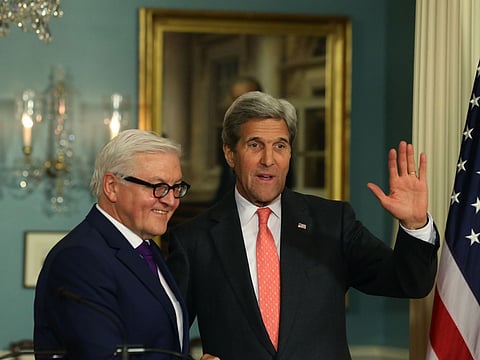Battling Daesh on the ground in Libya
Kerry’s military planners in Washington and their counterparts in Europe seem to have forced through the idea that military action is the priority

Last week, it was evident that the West had replaced diplomacy with military action to fight Daesh (the self-proclaimed Islamic State of Iraq and the Levant) in Libya, which will have serious security implications in the long term for all the ‘frontline’ states of Europe. Not only that, but the European Union’s (EU) survival as we know it is at stake.
Rumours about France’s special forces operating out of a compound in Benghazi’s Benina airport have been rife for weeks, corroborated by the Pentagon’s admission in January that ‘military advisors’ were criss-crossing the country looking for ‘good guys’ to collaborate with.
For 20 months, Libya’s small army and assorted militias had been intermittently pounding away at the city centre, held by both Daesh and other terrorist groups like Ansar Al Sharia, in what in fact was mostly a war of attrition. However, last week, the army broke through. In a well-planned operation with armoured units piercing the extremist lines, they poured through the city centre in an operation supplemented by artillery, air strikes and naval gunfire. This week, Benghazi is expected to be totally liberated in a major tactical accomplishment by the Libyan National Army (LNA). If not this week, then soon enough.
Coming just days after the United States killed 41 in air strikes on another Daesh base, in the town of Sabratha, west of Tripoli, the discreet French, supplemented by small numbers of British and American, Special Forces involvement is seen in military circles as enabling such successes for the LNA. In contrast though, Italy said last week that the US could fly armed drones from its bases, the Italian political will seems weak to allow this to happen.
In conclusion, Daesh in Benghazi and around Sabratha is retreating to fall-back positions to fight another day. But the fight against extremists is not over by a long shot.
Tackling Sirte is a more difficult matter. Daesh has deployed thousands of volunteers, most from either Tunisia or sub-Saharan Africa, and where it holds 110 miles (177km) of coastline. This requires the LNA to mount a major assault soon, which might require a degree of cooperation between the Tobruk and Tripoli rivals — unlikely, given the UN’s failure to create a unity government called the Government of National Unity (GNA), which only exists in exile, in a virtual world of the imaginations of UN/EU delusional bureaucrats.
The legitimate Tobruk parliament is in danger itself of splitting, mostly as a result of western meddling, half staying in Tobruk, with the other half seeking a new location, probably a southern town like Hun in the central desert. Anyway, neither will have the parliamentary numbers to vote the UN’s unrealistic plan through.
Last week, the US Secretary of State, John Kerry, insisted, incredibly, that the UN political process remains on track, pointing out that the West has chosen a Prime Minister for this government, Fayez Serraj, even though this choice was rejected by both Tripoli and Tobruk. “We have a Prime Minister designate, we have a government now; we have a couple of outliers that are resisting that effort. If they cannot get themselves together, yes it will be a failed state,” Kerry told the House Appropriations Committee on Foreign Operations. It seems like a last warning. When diplomacy ends, war begins. For America to say they have a “twin-track policy” is an oxymoron.
In fact, Kerry’s military planners in Washington, and their opposite numbers in Europe, are a step ahead of him and seem to have forced through the idea to their political masters that military action is the priority.
While back in Washington, the Judiciary Committee of the US Congress passed, on February 24, a bill urging the State Department to recognise the Muslim Brotherhood as a terrorist organisation. An organisation that many Libyans feel is, through Turkey, the main supporter of Daesh in Libya. And Turkey is part of Nato.
France, Britain and America, regardless of their denials, have now crossed the rubicon, from diplomatic inaction to military action, in the form of “advisors and trainers” who are nevertheless in full support of the LNA. That action in reality will be brutal, messy and may leave Libya more chaotic and disjointed than it already is, possibly breaking into two countries. But if that is the price for crushing Daesh on the southern Mediterranean and stopping what is now clearly unacceptable, uncontrolled migration to Europe that will no doubt bring Right-wing parties to power across the continent in the near term, it is a price the West and Libya must pay to preserve order.
Clearly, Daesh succeeding in Libya will seal the fate and demise of Europe as we know it. A larger, relentless military solution in Libya is the only option sooner rather than later.
Richard Galustian is a business and security analyst who has lived in Libya since 2011.



